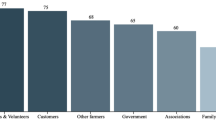Abstract
Actor network theory and supply chainmanagement theory provide suggestive researchdirections for understanding regional agri-foodnetworks. These theories claim that relationshipsbased upon trust and cooperation are critical to thestrength and vitality of the network. This means thatexploring and detailing these relationships among thesuppliers, producers, workers, processors, brokers,wholesalers, and retailers within specific regionalgeographies of these networks are critical forfurthering cooperation and trust. Key areas ofcooperation include resource sharing andapprenticeship programs. Employing food networks as akey unit of contextual analysis will deepen ourunderstanding of how to enhance their resiliency andvibrancy. Important questions can be raised about thedifference gender makes for farmers, brokers,entrepreneurs, and workers in local food networks.
Similar content being viewed by others
References
Altieri, M. A. (1998). “Ecological impacts of industrial agriculture and the possibilities for truly sustainable farming.” Monthly Review5(3): 60–71.
Bell, D. and G. Valentine(1997). Consuming Geographies.London and New York: Routledge Press.
Beus, C. E. and R. E. Dunlap (1990). “Conventional versus alternative agriculture: the paradigmatic roots of the debate.” Rural Sociology55(4): 590–616.
Boucher, D. H. (ed.) (1999). The Paradox of Plenty. Oakland, California: Food First Books.
Buck, D., C. Getz. and J. Guthman (1997). “From farm to table: The organic vegetable commodity chain of Northern California.” Sociologia Ruralis37(1): 3–19.
Copacino, W. C. (1997). Supply chain management. Boca Raton, Florida: St. Lucie Press.
Fawcett-Long, J. and P. Goldman (1999). Farms and Food Safety at Risk.Seattle,Washington: Earth Justice andWestern Sustainable Agriculture Working Group.
Goodman, D. (1999). “Agro-food studies in the 'age of ecology': Nature, corporeality, bio-politics.” Sociologia Ruralis29(1): 17–38.
FitzSimmons, M. and D. Goodman (1998). “Incorporating nature: environmental narratives and the reproduction of food,” in N. Castree and B. Willems-Braun (eds.), The Production of Nature at the End of the Twentieth Century. London: Routledge Press.
Friedland, W. H. (1991). “Women and agriculture in the United States,” in W. H. Friedland, L. Busch, F. Buttel, and A. Rudy (eds.), Towards a New Political Economy of Agriculture. Boulder, Colorado: Westview Press.
Goodman, D. (1999). “Agro-food studies in the 'age of ecology': Nature, corporeality, bio-politics.” Sociologia Ruralis39(1): 17–38.
Goodman, D. and M. Watts (eds.) (1997). Globalizing Food: Agrarian Questions and Agrarian Restructuring. New York: Routledge.
Heffernan, W. D. and D. H. Constance (1994). “Transnational corporations and the globalization of the food system,” in A. Bonanno, L. Busch, W. H. Friedland, L. Gouveia, and E.Mingione (eds.), From Columbus to ConAgra.Lawrence, Kansas: University of Kansas Press.
Jarosz, L. and J. Qazi (2000). “The geography of Washington's world apple: global expressions in a local landscape.” Journal of Rural Studies16(1): 1–12.
Jussaume, Jr., R. (2000). “Building trust with consumers,” Farming West of the Cascades. Pullman, Washington: Washington State University Cooperative Extension Food and Farm Connection (forthcoming).
Little, P. and M. Watts, eds. (1994). Living under Contract: Contract Farming and Agrarian Transformation in Sub-Saharan Africa.Madison, Wisconsin: University ofWisconsin Press.
Mackintosh, M. (1989). Gender, Class and Rural Transition.London: Zed Books.
Marsden, T. (1997). “Creating space for food: The distinctiveness of recent agrarian development,” in D. Goodman and M. Watts (eds.), Globalizing Food(pp. 169–191). New York: Routledge.
Marsden, T., J. Murdoch, and K. Morgan (1999). “Sustainable agriculture, food supply chains and regional development.” International Planning Studies4(3): 295–301.
Murdoch, J. (1997). “Inhuman/nonhuman/human: actornetwork theory and the prospects for a nondualistic and symmetrical perspective on nature and society.” Environment and Planning D: Society and Space15: 731–756.
Murdoch, J. (1995). “Actor-networks and the evolution of economic forms: Combining description and explanation in theories of regulation, flexible specialization, and networks.” Environment and Planning A27: 731–757.
Murdoch, J. and M. Miele (1999). “ 'Back to nature': Changing 'worlds of production' in the food sector.” Sociologia Ruralis30(4): 465–483.
Netting, R. (1993). Small Holders, Householders: Farm Families, Ecology and Intensive Sustainable Agriculture. Stanford, California: Stanford University Press.
Nygard, B. and O. Storstad (1998). “De-globalization of food markets? Consumer perceptions of safe food: the case of Norway.” Sociologia Ruralis38: 35–53.
Puget Sound Farm Direct Marketing Association (1998). Farm Fresh Guide 1998.Renton, Washington.
Redclift, M. (1989). Sustainable Development. New York: Methuen.
Rosset, P. (1999). The Multiple Functions and Benefits of Small Farm Agriculture in the Context of Global Trade Negotiations. San Francisco, California: Institute for Food and Development Policy at website: http://www.foodfirst.org/ pubs/policybs/pb4.html
Schotzko, R. T. and R. Hinson (2000). “Supply chain management in perishables: A produce application,” unpublished paper. Pullman, Washington: Dept. of Agricultural Economics, Washington State University.
Steele, C. J. (1997). “Why U.S. agriculture and rural areas have a stake in small farms.” Rural Development Perspectives, 12(2): 26–31.
Tweeten, L. (1993). “American agriculture: organization, structure, institutions and policy,” in L. Tweeten, C. L. Dishon, W. S. Chern, N. Imamura, and M. Morishima (eds.), Japanese and American Agriculture(pp. 71–96). Boulder, Colorado: Westview Press.
US Congress (1990). Food, Agriculture, Conservation, and Trade Act of 1990. Public Law 101–624. H11129. Congressional Record.
USDA National Commission on Small Farms (1998). A Time to Act, MP-1545. Washington, DC: US Government Printing Office.
Washington Tilth Directory1999. Seattle: Tilth Producers Chapter of Washington Tilth.
Whatmore, S. and L. Thorne (1997). “Nourishing Networks: alternative geographies of food,” in D. Goodman and M. Watts (eds.), Globalizing Food(pp. 287–304). New York: Routledge.
Wilson, N. (1996). “The supply chains of perishable products in Northern Europe.” British Food Journal98(6): 9–15.
Young, L. (1997). World Hunger. London and New York: Routledge Press.
Zuurbier, P. J. P. (1999). “Supply chain management in the fresh produce industry: Amile to go?” Journal of Food Distribution Research3(1): 20–30.
Author information
Authors and Affiliations
Corresponding author
Rights and permissions
About this article
Cite this article
Jarosz, L. Understanding agri-food networks as social relations. Agriculture and Human Values 17, 279–283 (2000). https://doi.org/10.1023/A:1007692303118
Issue Date:
DOI: https://doi.org/10.1023/A:1007692303118




